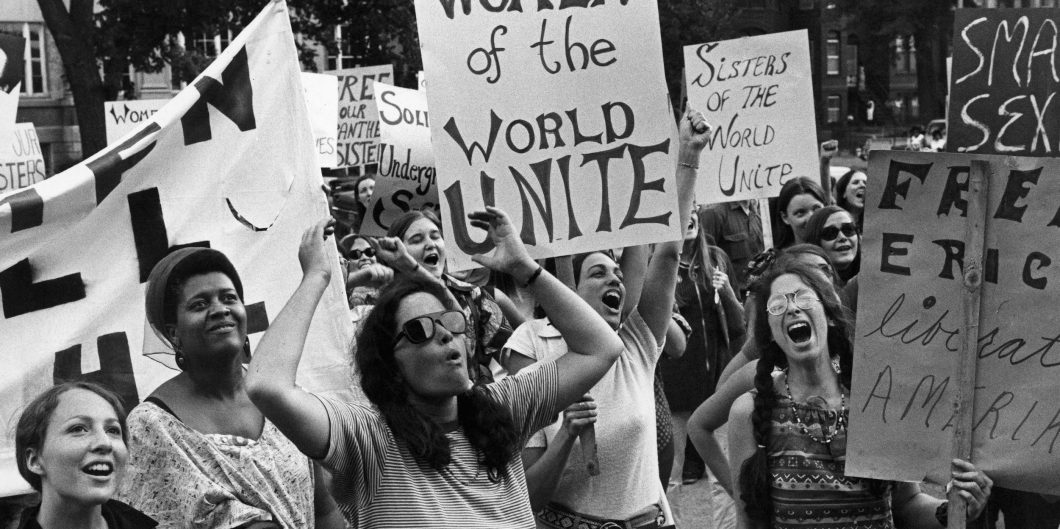À la Carte Feminism
Editor’s Note: This review is part of a symposium on Erika Bachiochi’s The Rights of Women: Reclaiming a Lost Vision.
The titular “lost vision” of Erika Bachiochi’s new book is a “dignitarian feminism” traceable, surprisingly, to Mary Wollstonecraft, famed author of Vindication of the Rights of Woman (1792). This strand wends through Elizabeth Cody Stanton, Betty Friedan, Ruth Bader Ginsburg, and others, who inconsistently and imperfectly adhere to its ways.
The first element of dignitarian feminism seems to be granting women rights. If women would get rights to own property, to serve on juries, and to vote, then men would shape up and families would be strong. Freeing women politically and socially, Bachiochi seems to believe, would free them to do their duties as mothers and wives. Bachiochi’s Wollstonecraft is confident that the difficult job of reconciling rights and duties takes place because both natural law and God reveal natural duties. Thus freedom leads to duty because natural law reveals a higher human purpose—and that purpose includes family life and other things too (presumably). Wollstonecraft’s Vindication of the Rights of Woman is, in Bachiochi’s telling, “scarcely about rights at all.” Virtue without liberty never gains due strength, and progress in virtue “would guarantee personal, familial, and societal happiness. This was [Wollstonecraft’s] claim.”
As Bachiochi relates, Wollstonecraft seems to adhere to the idea that marriage without political equality for women is akin to slavery (as Richard Price, a thinker Bachiochi thinks is “foundational” to Wollstonecraft, writes). Bachiochi seems to endorse Wollstonecraft’s formulation: “Make women rational creatures, and free citizens, and they will quickly become good wives, and mothers; that is—if men do not neglect the duties of husbands and fathers.” Previous societies also did not make women into free citizens, and therefore, it seems, Wollstonecraft did not also think they could have been good mothers or good wives. Older societies emphasized duty, but they were unjust because they did not provide political liberty or political equality and therefore could not produce good wives and mothers. Thus the need for rights!
Bachiochi notices Wollstonecraft’s position and seems to admire it. Wollstonecraft’s position seems inconsistent with the claims of natural law and duty, however. Natural law and duty cannot be so abstracted from human experience as to be totally undercover for millennia. Human purpose shows itself, under conditions of freedom and through social conventions, but Wollstonecraft is a great critic of all previous social conventions with respect to women. No previous political community had ever granted women the political freedom and equality as Wollstonecraft wanted to see. Was duty never practiced before? Surely a progress informed by virtue would make all happier, but is political freedom and equality a sufficient condition for such progress? Is it even a necessary condition? What is more important for solid family life: Christian faith or freedom? These questions may have dissuaded generations of scholars against taking Wollstonecraft’s claims about natural law and duty seriously. When I was writing my first book on the history of marriage in modern thought in 2006, I read Wollstonecraft’s whole corpus and decided that she was derivative of Locke’s strategy on natural law and duty.
The second part of dignitarian feminism is a new sexual ethic. “All the causes of female weakness, as well as depravity,” Wollstonecraft writes, “branch out of one grand cause—want of chastity in men.” Bachiochi seems to admire this analysis. Men are more powerful and have stronger sexual desire than women, while women bear the consequences of sex more than men. This made men into patriarchs in the past. No more. An ethic of “voluntary motherhood” would, in Bachiochi’s words, expect “men to conform themselves to women’s sexual needs and desires rather than to their own.” What “the right to control their body” meant for these early feminists, Bachiochi insists, was periodic abstinence so that women could avoid pregnancy and men could learn “self-mastery.” Easy access to abortion or contraception would therefore compromise the ability of women to govern men and hence compromise the goals of feminism. Men and women would become true, equal, and perhaps interchangeable partners in families under this vision. As Bachiochi writes (apparently endorsing the sentiment) virtue has no sex.
Fast forward to second-wave feminism, where the problem of “women’s rights” again arose. Like her Wollstonecraft, Bachiochi’s second-wave feminists thought that securing rights was not enough to accomplish a new marital regime or genuine lives of virtue for women. Culture transformation was also indispensable to authentic development. Friedan and Ginsburg seem to be part of the tradition of dignitarian feminism.
Bachiochi writes of “Friedan’s (Almost) Wollstonecraftian solution.” Like Friedan, as Bachiochi writes, “Wollstonecraft believed that the very first duty of a human person is to develop his or her capacities, to actualize what is potential.” Workplaces more friendly to woman would help them “realize their full potential”—and presumably the state should step in to help with that. Through Friedan’s efforts to end sexual discrimination and Ginsburg’s to rescind laws reflecting sexual stereotypes, each embraced the “Wollstonecraftian hope” that “by freeing both women and men from legally determined familial and social roles, the law might open the way for better collaboration between men and women in the family and in the workplace.” And since culture follows the laws (a thought Bachiochi later seems to endorse), this elimination of legal roles for men and women would have big-time downstream effects in culture. The women without social roles based on sex would, on this Wollstonecraftian logic, be better citizens, better employees, better wives, and better mothers, leading to better families.
The only thing that could screw up this Wollstonecraftian hope is a mistaking of duty or an attack on it. And sometimes Friedan and Ginsburg did precisely that, Bachiochi concedes. They were wrong to think that the only real way of fulfilling one’s potential was in creative work outside the home. Friedan called housewives “parasites” who occupied “comfortable concentration camps.” That goes too far. But Bachiochi seems to endorse Friedan’s view that being too maternal was a real problem, and a career focus would help limit the damage mothers could do. “Fully human women,” Bachiochi writes, “would not infantilize their children by smothering them,” and certainly Friedan would rather have absent mothers than those that “smother” their children. For Friedan, at times, it seems that to mother is to smother—one cannot spell the one without the other! But that is not an indictment of all motherhood and caregiving, Bachiochi holds. Ginsburg criticized all the world’s religions, Bachiochi notes, for subordinating women; no doubt Wollstonecraft would agree with Ginsburg. Bachiochi seems to find this problematic; it would be interesting to know why.
What is more, Bachiochi’s latter-day, almost-Wollstonecraftians thought feminist cultural transformation and sexual revolution were a package deal. Legal abortion is, in the words of one advocate, “the linchpin for women’s sexual freedom and success in the workplace.” Women could be freed from “enforced motherhood” and brought, in the words of the National Organization of Women’s charter, “into full participation in the mainstream of American society” only if they could control their reproduction. Contraception and abortion would bring “true equality for all women.” The logic seems impeccable, granting feminist premises. Both contraception and abortion make sense if women have no duties to become mothers and if “self-actualization” is a goal.
What modern feminists thought was a package of purpose-fulfillment and sexual liberation, Bachiochi tries to convince us, betrays real feminism. For Bachiochi, “The women’s movement of the late twentieth century shook off its ennobling heritage and embraced the pragmatic demands of the day” when it embraced sexual liberation. Ginsburg’s “ardent abortion advocacy” was, Bachiochi holds, “deeply in tension with her normative goal to support women and men’s shared task of caregiving.” It undermines the idea of male responsibility, by putting all of the sexual pressure on women choosing to use contraception or abortion.
Bachiochi does not blame feminism for sexual liberation. Instead, she lays the blame on free market capitalism. Feminists rejected the ennobling logic of feminism as they “adopted the logic of the market” to embrace sexual liberation. This diagnosis Bachiochi shares with Harvard law professor Mary Ann Glendon, another latter-day Wollstonecraftian. Everywhere in the Western world, but especially in America, there has arisen, in Glendon’s words, an ethic that “systematically disadvantages caretakers and dependents” and a new marriage imagined as “an association of separate individuals.” These tendencies have leaked into divorce law, sexual ethics, and images of pregnancy. Even women’s rights advocates were swept up in the mania of this rights talk, something so contrary to their nature.
As Bachiochi presents it, Glendon’s “dignitarian feminism” would realize our collective responsibility for pregnant women and support them as they carried their children to term and then afterward with generous welfare benefits. Even Friedan, the former communist sympathizer, signed on to Glendon’s ringing critique of how capitalism’s careerism and the “ever-encroaching market mentality undermines family life.” Again, not feminism, but capitalism. Glendon adds that the market mentality has also given us no fault divorce and has turned sexual access into a commodity. Both developments have hurt women and helped men.
Bachiochi’s unsexed guiding principle for a good marriage is that “domestic affections ought to take priority over professional responsibilities in the lives of both women and men, for their own flourishing, their children’s, and that of society at large.” Not duties, but affections. Not sex roles, but shared responsibilities. Not a more public man and a less public woman, but two parents. Reaching one’s potential and a culture of caregiving and mutual dependence are reconcilable because teleology and natural law inform daily decisions.
How to add up the public ethic that Bachiochi’s dignitarian feminism would embody? It would be anti-sexual liberation since liberation feeds male sexual desire and makes women into attention-grabbing weaklings (and also, perhaps, because it breaks the link between sex and marriage). It would be pro-women’s rights, including, it seems, all of the first-wave rights that Wollstonecraft was concerned with and the non-sexual liberation second-wave rights that the almost-Wollstonecraftians embraced. No laws or government entity would tailor polities around the tendencies of men and women or boys and girls. The culture would follow the laws, presumably. Generous government benefits would allow people to do their duties as parents. Many would still have a sense of duty that comes from natural law and the teleological understanding of nature that points people to caregiving. This sense of duty might be institutionalized and taught somewhere. I doubt duty-enforcing institutions could not survive the anti-discriminatory feminist laws and culture that, from what I can tell, Bachiochi also embraces.
This is why I see her book as an expression of à la carte feminism. The argument adopts crucial aspects of the feminist project of granting rights to women but they are made tame and social through governing them with duties and natural law. It does little to uphold the public status of motherhood and fatherhood, while at the same time promising that everything will turn out all right because of a shared sense of responsibility. It denies that freeing women in the marketplace on mostly feminist grounds points inexorably to freeing women sexually from the constraints of nature and marriage. One gets contraception and abortion precisely in countries governed through feminist ideology as Ginsburg and Friedan defined it. Thus, it has happened everywhere in the world where feminist ideology takes root. It hardly serves the pro-life position, to which I am every bit as attached as Bachiochi, to deny this reality.
Bachiochi tries to split the difference by emphasizing that feminist rights are hemmed in with a natural law teleology. The efficacy of that approach, I would humbly submit, has gotten advocates nowhere. Only by revisiting the premises of feminism wholesale can any progress toward a decent family regime be made.


